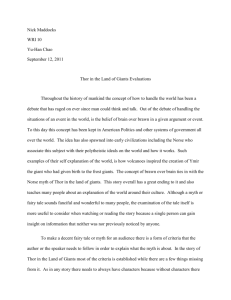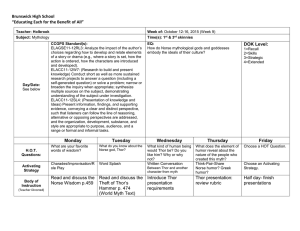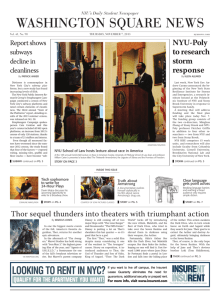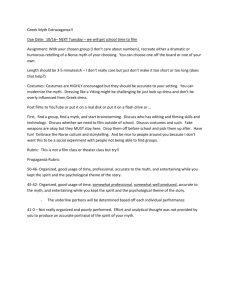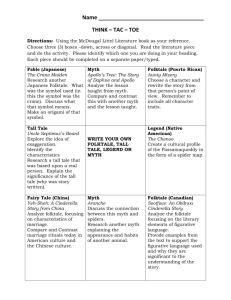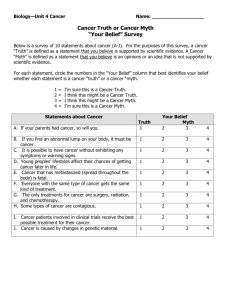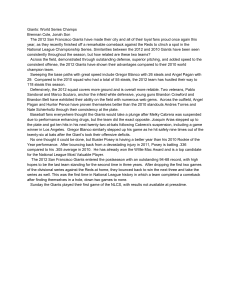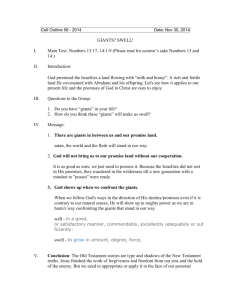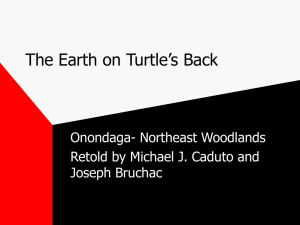Essay 1 final draft
advertisement
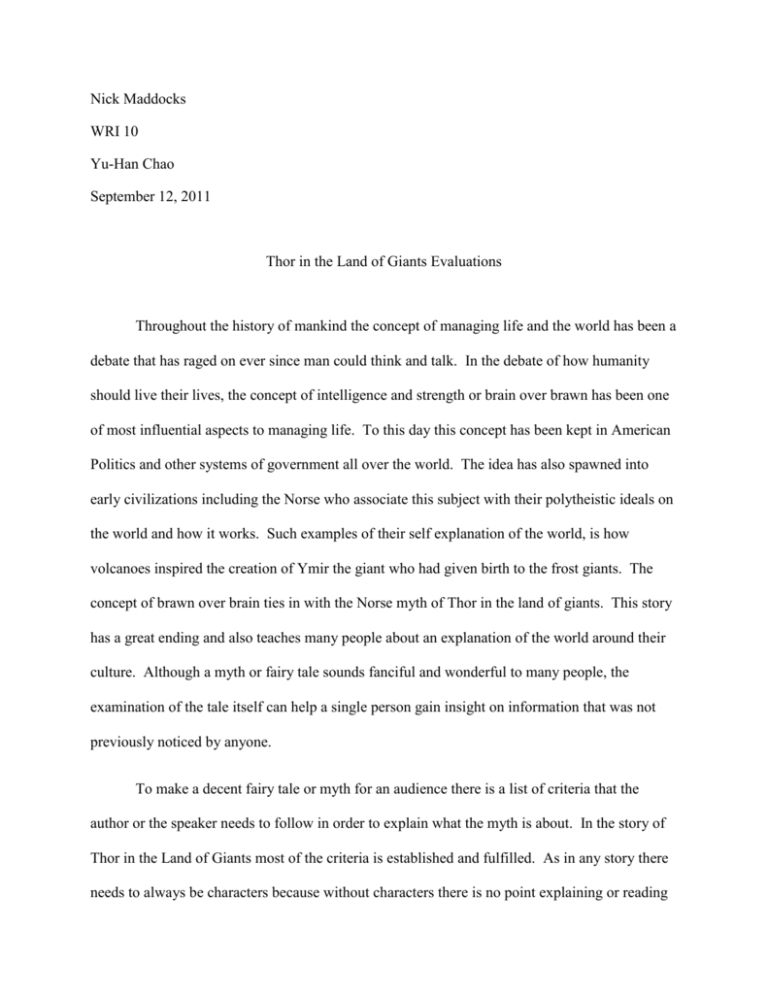
Nick Maddocks WRI 10 Yu-Han Chao September 12, 2011 Thor in the Land of Giants Evaluations Throughout the history of mankind the concept of managing life and the world has been a debate that has raged on ever since man could think and talk. In the debate of how humanity should live their lives, the concept of intelligence and strength or brain over brawn has been one of most influential aspects to managing life. To this day this concept has been kept in American Politics and other systems of government all over the world. The idea has also spawned into early civilizations including the Norse who associate this subject with their polytheistic ideals on the world and how it works. Such examples of their self explanation of the world, is how volcanoes inspired the creation of Ymir the giant who had given birth to the frost giants. The concept of brawn over brain ties in with the Norse myth of Thor in the land of giants. This story has a great ending and also teaches many people about an explanation of the world around their culture. Although a myth or fairy tale sounds fanciful and wonderful to many people, the examination of the tale itself can help a single person gain insight on information that was not previously noticed by anyone. To make a decent fairy tale or myth for an audience there is a list of criteria that the author or the speaker needs to follow in order to explain what the myth is about. In the story of Thor in the Land of Giants most of the criteria is established and fulfilled. As in any story there needs to always be characters because without characters there is no point explaining or reading the story. Each character in the story of Thor in the Land of Giants is a representation of a certain aspect of life or part of a natural occurrence of life. Thor is represented as the strong and forceful type along with the family that travels with him, while his brother Loki who also travels with him is the representation of intelligence. On the other hand the giants are the representation of wit and cunning in any challenge or obstacle. The power of logic and reasoning is representative of each giant. For example the giant Utgard Logi is a representation of fire in that his hunger is never satisfied and how the old female giant was old age, and as always old age in humans can never be beaten or defeated. Each character had a different aspect, but with characters there is needed a plot for the characters to follow. The plot takes place in many places which first starts in Asgard and eventually ends in Joutenheim or the land of giants. The plot also needs conflict and resolution and the story has both a conflict and a resolution. The main conflict in particular is the contest between Thor and Loki in which decides whether mind or strength is more powerful in a given argument or situation. The resolution in the end is that intelligence ultimately triumphs and Thor is left admitting that he was wrong about strength. On an entertainment level, the story is rich in detail and realistic with the feel as though someone were truly eating, racing, or challenging giants to competition. This story should be recommended to readers of all ages who can learn from Thor’s experience of humility and defeat. With Thor’s humility is also the important lesson of whether brain or brawn was the true way of fighting. The rivalry of brain and brawn has been featured in many other myths besides Norse Mythology. Heracles, quite often depicted as rash and simpleminded, was a Greek hero who used brute strength over the mind of intelligence in his labors, but he is also a combination of both strength and intelligence in the labors that he had performed during his lifetime. Another example of intellectual superiority was the Jewish story of Hershel and the Hanukah Goblins in which the trickster known as Hershel of Ostropol used his wit to outsmart seven goblins that were ruining the holiday of Hanukah for a helpless village and eventually outsmarting the dreaded and evil King of the Goblins. But the concept of intelligence over strength that was the only lesson learned. It had also taught people about humility in life. The lesson of humility is a powerful: even in our lives altogether. It teaches every person a new meaning of life and why it is important to respect it as each life progresses in time. In Thor’s case, he might have become much wiser and eventually triumph. Of course, brute strength isn’t completely useless in a given situation and in fact can be helpful if used correctly. Also powerful, is the appeal of the book itself. It is difficult for most readers to feel attracted to a story or myth. Some readers actually still judge a book by its cover and look at the pictures to gain an understanding on what the story is about. But the pictures can mislead someone into thinking what a story is about and in fact it is the literature that holds the true essence to any tale told or explained to this day. The pictures of course do hook the reader into the book but the story is more important in the moral lessons that are given to the reader. The story of Thor in the Land of Giants caught my eye with the use of images but also with the beginning paragraph of the book which described Thor and Loki’s wager on whether intelligence or brute strength were the true alternatives in battle. It became one of my favorite Norse myths and the lesson learned from it still hangs around in my head even to this day. Any story can explain a lesson to someone, it all depends if the reader is willing to read or even hear about in the first place. The story is worth reading and is highly recommended, even if it is not truly what many readers would expect of it. Being hooked is one thing but being interesting is another matter that anyone needs to overcome to immense in a new story or tale. About the interest level there are a few negatives it the tale altogether. The people who do not like to be stringed along with a big surprise at the end should not read this story because it has a tendency of stringing along the reader and eventually ending with the symbolism of each challenge. The Norse myth is a bit lengthy but still worth the reading time. Some parts don’t make sense and the evil power of hindsight can hang in the air after the story. Such examples are on some of the characters and explanation of how each giant represented an aspect of logic in the world. But in the realm of mythology the use of intellectual evidence is hard to pinpoint and in the name itself this is myth so most of the story was inspired by something else and was most possibility to being real. But these are the only factors that are the real negatives of the book and the rest are either minor or can be explainable by experts or other people. Otherwise this book of myths is something that generations should never forget. To understand the true meaning of a fairy tale or myth is the first step to understanding one of the many natures of humanity itself. Every storyteller or writer follows a certain structure that suits the appropriate setting for the tale. Any myth or tale has a lesson or values that should be learned during or at the end of the story. Also if a reader gives the story a chance each person can benefit from what can be learned in life itself. Even though there are a few negatives and hindsight in some of the myths it only matters if a single person or more truly recognize the main theme throughout the tale. For Thor in the Land of Giants and other stories that could teach the concept of brain and brawn in a given situation, this is the story to start before reading anything else. Full of action for the senses of adventure and mystery this story benefits readers as not only a lesson about brain and brawn but also an explanation of the world. With each myth a person gains an insight in what each civilization thought about a long time ago and still, the same people still hold the old customs and traditions of old. Without understanding another culture people cannot truly relate to another person without recognizing the early beliefs. To understand these early beliefs is to pick up a story and start reading. Works Cited: Kimmel, Eric. Hershel and the Hanukkah Goblins. New York: Holiday House, 1989. 1-30. Print Philip, Neil. The Illustrated Book of Myths Tales and Legends of the World. New York: DK Publishing Special Markets, 2007. 118-124. Print.
